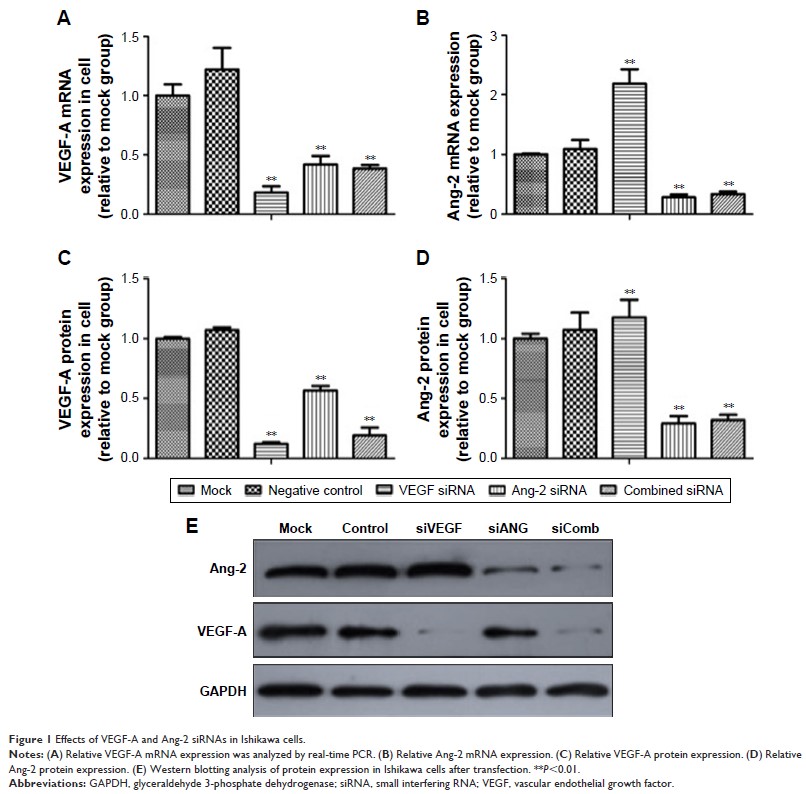9 0 6 7 6
论文已发表
注册即可获取德孚的最新动态
IF 收录期刊
- 2.6 Breast Cancer (Dove Med Press)
- 3.9 Clin Epidemiol
- 3.3 Cancer Manag Res
- 3.9 Infect Drug Resist
- 3.6 Clin Interv Aging
- 4.8 Drug Des Dev Ther
- 2.8 Int J Chronic Obstr
- 8.0 Int J Nanomed
- 2.3 Int J Women's Health
- 3.2 Neuropsych Dis Treat
- 4.0 OncoTargets Ther
- 2.2 Patient Prefer Adher
- 2.8 Ther Clin Risk Manag
- 2.7 J Pain Res
- 3.3 Diabet Metab Synd Ob
- 4.3 Psychol Res Behav Ma
- 3.4 Nat Sci Sleep
- 1.9 Pharmgenomics Pers Med
- 3.5 Risk Manag Healthc Policy
- 4.5 J Inflamm Res
- 2.3 Int J Gen Med
- 4.1 J Hepatocell Carcinoma
- 3.2 J Asthma Allergy
- 2.3 Clin Cosmet Investig Dermatol
- 3.3 J Multidiscip Healthc

VEGF-A 和血管生成素-2 的联合沉默是抑制子宫内膜癌细胞系 Ishikawa 的更有效方法
Authors Xu X, Yan Y, Xun Q, Shi J, Kong X, Wu J, Zhou H
Received 9 November 2018
Accepted for publication 20 January 2019
Published 14 February 2019 Volume 2019:12 Pages 1215—1223
DOI https://doi.org/10.2147/OTT.S194064
Checked for plagiarism Yes
Review by Single-blind
Peer reviewers approved by Dr Cristina Weinberg
Peer reviewer comments 2
Editor who approved publication: Dr XuYu Yang
Background: Angiogenesis
is critical for the growth and metastasis of solid tumors and is, therefore, an
important therapeutic target. Despite the great research advances in tumor
therapies targeting vascular endothelial growth factor (VEGF), drug resistance
frequently occurs, and further strategies targeting the tumor vasculature are
of primary concern.
Purpose: The
present study aimed to determine whether a combination of small interfering
RNAs (siRNAs) targeting VEGF-A and angiopoietin-2 (Ang-2) inhibited the
biologic mechanisms of endometrial cancer more effectively compared to either
one alone, in vitro and in vivo.
Methods: VEGF-A
and Ang-2 were silenced by siRNA in Ishikawa endometrial cancer cells. Cell
growth, apoptosis, metastasis, and tumor angiogenesis were measured in vitro
and in vivo.
Results: There was
no difference observed in cell apoptosis rate; however, combined silencing of
VEGF-A and Ang-2 resulted in a stronger inhibition of cell proliferation and
invasion (P <0.05).
Similarly, a greater reduction of tumor size and angiogenesis was seen with the
concurrent administration of siRNAs targeting VEGF-A and Ang-2 in nude mice (P <0.05).
Conclusion: Our data
indicated that simultaneous blockade of VEGF-A and Ang-2 may serve as a novel
and effective therapeutic strategy in endometrial cancer.
Keywords: drug
resistance, siRNA, Ang-2, angiogenesis
